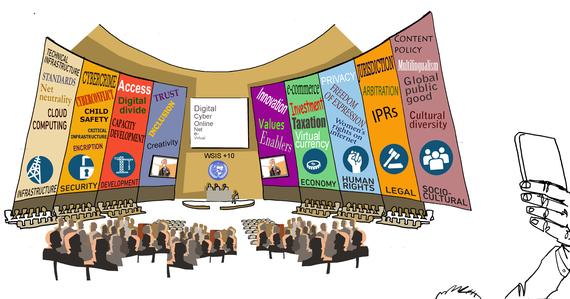The UN's ten-year review of World Summit on Information Society (WSIS) concluded successfully with the adoption of the WSIS+10 Resolution on 16 December 2015. The review process was a 'diplomatic sprint': in just a few months (effectively since September this year), negotiators managed to draft a complex and diplomatically delicate text.
Rough Consensus
- 'Development is increasingly digitally-based' is the first message of WSIS+10. Almost half of the WSIS+10 Resolution covers digital development. In addition, the Resolution has a strong link with the 2030 Agenda for Sustainable Development. As the ITU's matrix shows, all of the 17 sustainable development goals rely on digital technologies in the implementation process.
- 'Cyber(in)security profoundly affects modern society' is the second message of WSIS+10. An entire section of the Resolution, consisting of seven paragraphs, is devoted to this topic, including an expression of concern regarding the use of the Internet for terrorist purposes and cybercrime.
- 'Human rights offline apply equally online' is the third message of WSIS+10. A section containing eight paragraphs restates previous agreements that all human rights online are universal, indivisible, interdependent, and interrelated.
Ambiguous Compromise
While WSIS+10 reached rough consensus on development, security, and human rights issues, the topic of Internet governance - like ten years ago at the WSIS Summit in Tunis - kept negotiators working until the early morning hours. The main division between the inter-governmental and the multi-stakeholder approaches to Internet governance remains alive. To address this division, WSIS+10 reaffirmed three core elements of the 'Tunis compromise'.
- First, it extended the IGF mandate for 10 years and reaffirmed its underlying architecture, meaning that Internet governance is addressed under the UN umbrella, but in a multistakeholder manner.
- Second, it retained the roles and responsibilities of the stakeholders as outlined in the Tunis Agenda.
- Third, it maintained the element of ambiguity around an enhanced cooperation arrangement, which allows for different interpretations. A new element is the request for the strengthening of the IGF.
Towards WSIS 2025
The main question remains: will the reinforced 'Tunis compromise' of the WSIS+10 Resolution serve future digital developments well?
On the policy level, the 'Tunis compromise' allows all actors to interpret the arrangement to suit their policy priorities. It is also broad enough to facilitate future developments. For example, the provision on the IGF provides the possibility for the Forum to make recommendations, 'where appropriate' (paragraph 72).
When it comes to practical problems in the digital sphere, individuals and institutions will look for solutions. Unlike most other global policy processes, including climate change, digital problems have a direct and immediate impact on Internet users. For example, cyber-attacks, online hate speech, or online child pornography all affect noticeable individuals and organizations worldwide.
In the search for solutions to their digital problems, Internet users and organisations increasingly refer to courts. This year, the Court of Justice of the European Union (CJEU) ruled on Facebook and the Safe Harbour arrangement. It is currently being deliberated whether Uber provides transportation or communication services. Together with the previous 'right to be forgotten' case, these CJEU rulings have a strong impact on global digital policy.
US courts are busy with judging on net neutrality regulation, as well as on the Microsoft case regarding the access of US authorities to data stored outside the USA. A judge in Sao Paulo (Brazil), ordered WhatsApp to shut down for refusing to turn over data in an investigation case. The growing involvement of courts in dealing with transnational digital policy issues is also noticeable in other countries. Since judges are not very tolerant of ambiguous solutions, the court jurisprudence may tilt some delicate balances in global digital policy.
Self-help through technical solutions is another trend. For example, Internet companies and users increasingly rely on strong encryption. This has led law-enforcement and security agencies to complain that strong encryption limits their access to digital content relevant to criminal investigations and anti-terrorist activities. The impact of encryption on security has come into sharper focus after the recent terrorist attacks.
All in all, juridical, technical, and other means to address digital policy issues will be used more and more often. Could these trends undermine WSIS efforts to establish a collective set of principles for global digital development? Are court rulings (mainly in Europe) becoming a new way of regulating digital reality?
WSIS successfully passed the test of the first ten years. There are many reasons to believe that its success will continue. However, digital policy needs to evolve to deal with 'known knowns' (for example, the Internet governance framework), 'known unknowns' (dealing with big data and the Internet of Things) and 'unknown unknowns' which will inevitably emerge. Solutions that have worked well in the past will not necessarily be effective in the fast changing context of the future.
In the words of our WSIS+10 recipe: 'Keep stirring it carefully for the next ten years, but make sure it does not overcook in the meantime.'
Excerpt from the Summary Report from the UN General Assembly WSIS Review Meeting | Visit GIP Digital Watch

